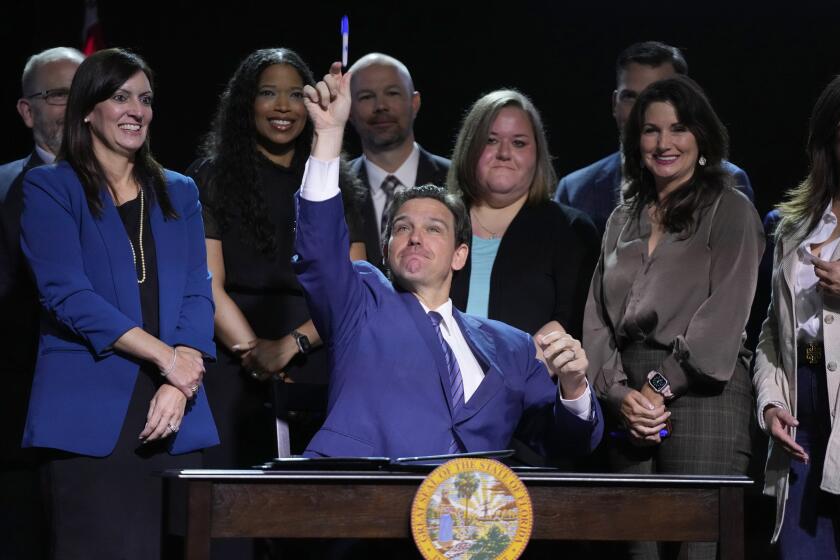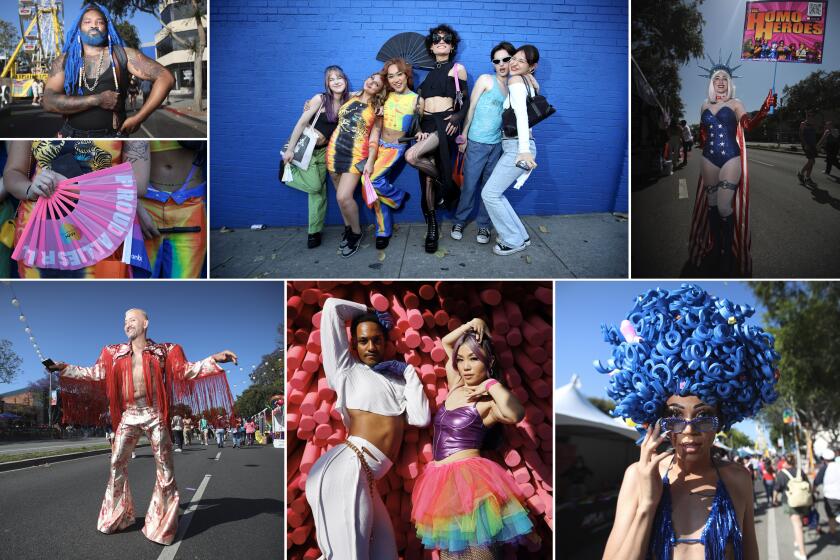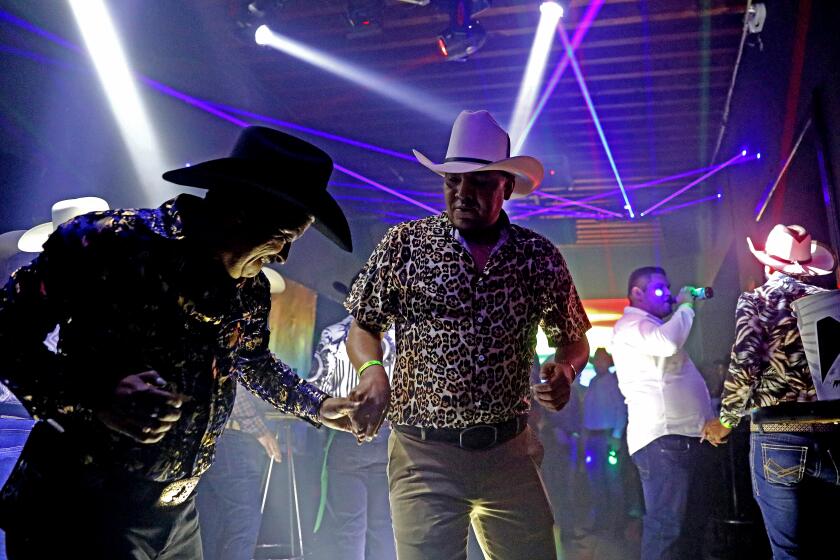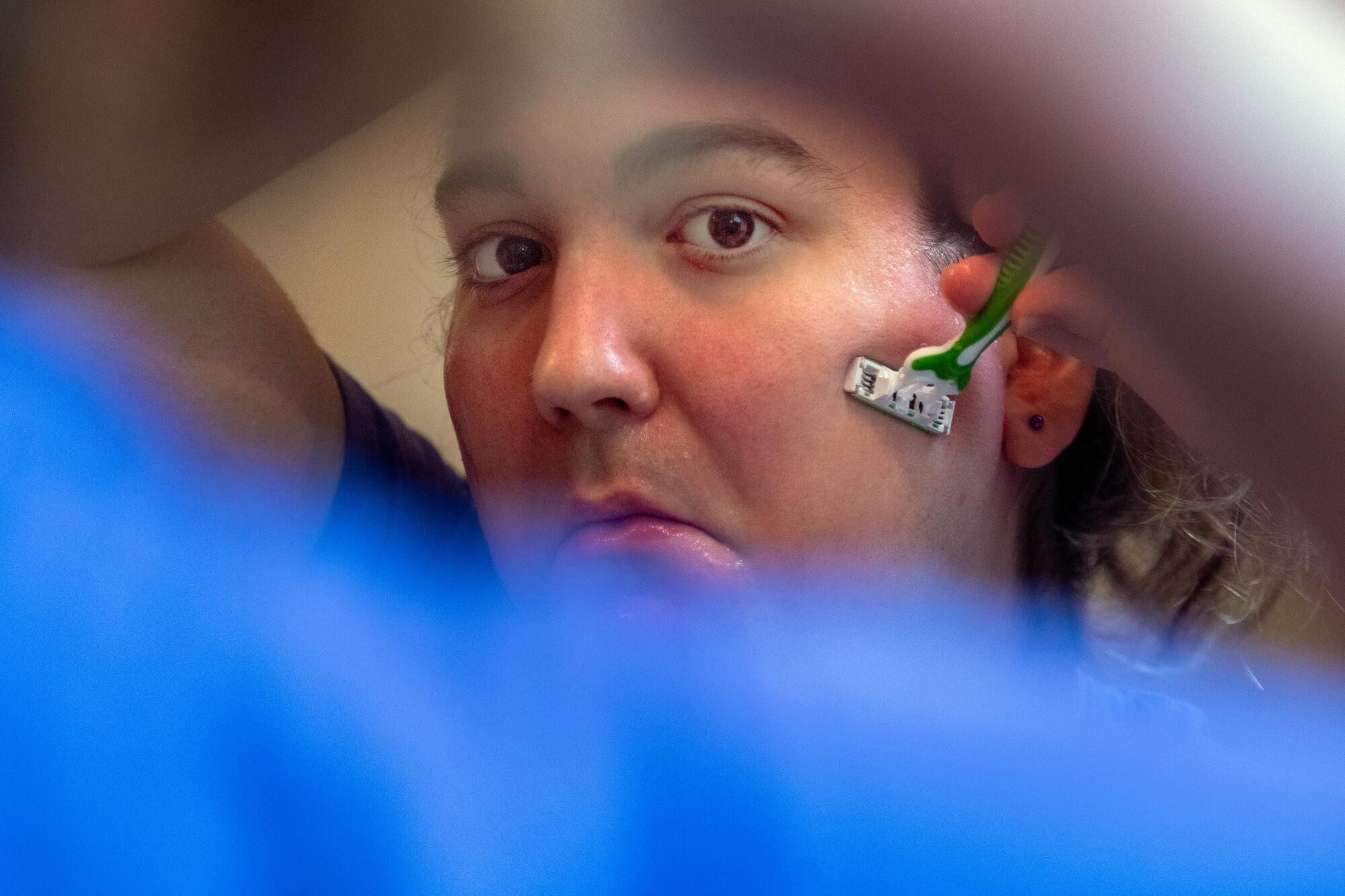
- Share via
MIDDLEBURG, Fla. — Life in small-town Florida was once about blissfully losing her way on hikes, lounging by swimming holes and taking long drives to visit her favorite alligator zoo.
Now, each step outside was laden with anxiety as she rushed to memorize a mental map of the safest bathrooms and fastest ways to navigate Walmart before strangers might begin to stare.
As a transgender woman in a state where the governor declared war on “transgender ideology,” Violet Rin felt her image of Florida as an idyll fading. She became a near recluse, doubtful that much outside was worth the risks.
Then she got a message from the clinic where she obtained her estrogen prescriptions.
A new state law restricting who could give medical care to transitioning adults “went into effect immediately,” it said. “We will not be able to provide care for transgender patients.”
Rin had called Florida home for nearly all of her 27 years. But now she felt like the state wanted to destroy her.
Would she join the nearly 1 in 10 transgender individuals in the U.S. who have left their neighborhoods or states because of new laws restricting the rights of LGBTQ+ people? An additional 4 in 10 have considered a move, according to a recent survey by the left-leaning think tank Data for Progress.
The American battle over transgender rights has focused on minors and their access to puberty blockers, hormones and surgeries. Florida, along with 19 other Republican-led states, banned those treatments for people younger than 18. But it went a step further than most by also targeting transgender adults.
That’s led many people to ration or stockpile estrogen or testosterone, turn to the black market or raise money to flee to states with recently passed “trans sanctuary” protections.
“This is where I grew up, where I went to school, where my family lives,” said Rin, who was raised in Middleburg, an unincorporated community of 12,000 outside Jacksonville.
Her embrace of her identity as a transgender woman coincided with Florida lawmakers’ targeting of a community that, according to the Williams Institute at UCLA, numbers 111,000, or about 0.5% of the state’s 22 million residents.
This spring Gov. Ron DeSantis, a 2024 presidential hopeful, signed the most extreme laws in the nation focusing on transgender people, praising the legislation as the means for the state to “remain a refuge of sanity.”
Looking back, Rin realizes her story started long ago.
Raised as a boy, she was uncomfortable in her body but never sure why. The khaki pants and polo shirts she wore to church seemed wrong. She never felt right taking her shirt off at the pool. She was frustrated when her parents refused to buy her pink toys.

As a teenager, dating felt alien. She tried to be straight, gay and pansexual — someone attracted all genders, including people who are not women or men. None felt right. She faced anxiety and depression.
She struggled to make friends but felt more at ease behind a computer screen. So she taught herself information technology and now works remotely in software support for optometry offices.
Around her, Florida’s politics were transforming as a Republican governor and Legislature taking a hard turn to the right focused on transgender people. At first, their moves made little difference to her.
In June 2021, when DeSantis signed a bill barring transgender girls and women from playing on school teams that matched their gender identity, Rin said she “didn’t notice it.”
Raised in a Republican family but uninterested in politics, Rin didn’t know then that she was transgender.
Florida is banning gender-affirming care for minors and enacting a series of other anti-LGBTQ+ bills signed by Republican Gov. Ron DeSantis.
She mostly kept to herself in her manufactured home down a dirt road in Middleburg, near the schools she attended as the kid of a Navy dad and an Air Force mom. When not playing video games, she spent time hiking and gardening. She found joy in snapping photos of native plants she cultivated in her yard: the white and yellow of Bidens alba, the ruby berries of winged sumac, and milkweed in pink and white.
The growing political debate over the lives of transgender people — their access to sports, bathrooms, hormones, surgery and more — didn’t faze her.
But around New Year’s Day 2022, everything changed.
Alone at home, Rin signed on to VRChat. In the virtual reality platform, players wear headsets and control three-dimensional avatars in everyday scenes — coffee shops, gyms and public parks among them — and talk with others.
“This is where I grew up, where I went to school, where my family lives.”
— Violet Rin
She chose a female, anime-style avatar with big, oval blue eyes. Sweatpants and a baggy sweater concealed the body’s contours. A big bow draped over brown hair fell above the shoulders.
“Something clicked,” Rin recalled.
“Looking in a mirror, seeing this person looking back at me and moving around and it not being in my own body ... I questioned how I felt so forced to be how I was told I was supposed to be.”
At first, Rin said, she was confused, and scared to explore deeper. She grew more comfortable as she kept returning to the game as a girl. One day, she joined a chatroom within the game that randomly connects players one-on-one for two-minute talks. Rin met a transgender woman, and they spoke for hours.
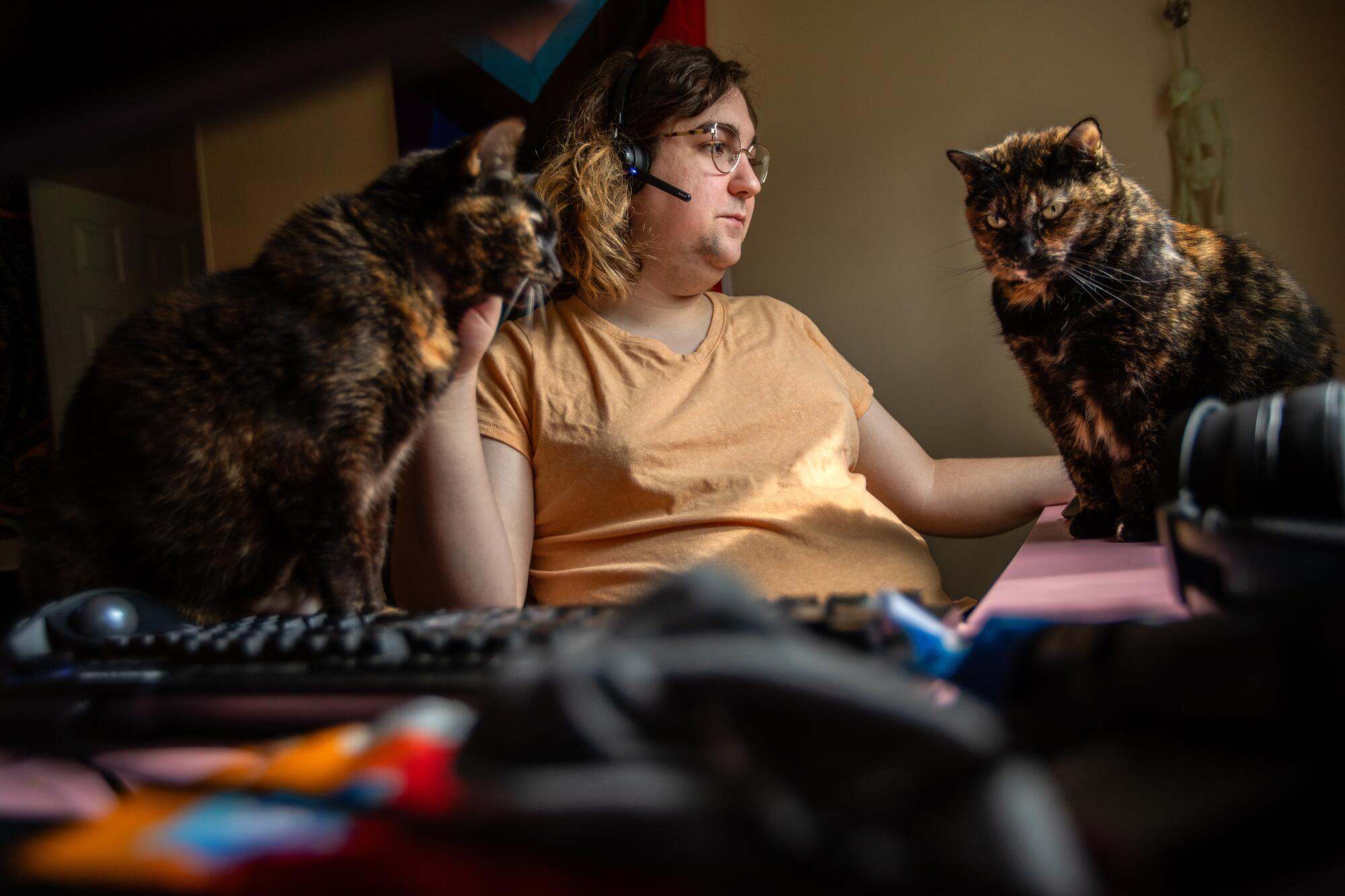
Rin logged on every day for weeks and got to know more transgender players. Their stories of feeling at odds with looking, dressing, talking and calling themselves the ways expected of them felt familiar to her.
“I turned the flashlight on myself. The walls I had built up weren’t there. It was sticks glued to rocks and it tumbled,” she said. “It was like a dark dungeon around me fell, revealing the sunlight in a world of colors.”
At 25, Rin was coming out to herself.
For months, she continued to virtually embody a girl. She hired an artist to create an avatar in a bubble-gum pink off-the-shoulder long-sleeved crop top with matching mini-shorts and striped over-the-knee socks. The big bow on the head remained, now in pink.
A Times reporter and photographer interviewed attendees at West Hollywood’s longstanding Pride celebration. At a time when states are implementing legislation targeting LGBTQ+ communities, some said they came to Pride for fun, some to find community, and some to be heard.
Outside the game, she found a therapist.
Rin tried new pronouns. She felt out new names, each inspired by a plant or flower, before settling on Violet — one of her favorite colors. She slipped on skirts in a Walmart dressing room. She shaved her legs and experimented with makeup. She enrolled in voice lessons on Zoom to learn new ways to move her lips, mouth and the muscles in her neck to raise her pitch, stretch vowels and elongate consonants.
The name and pronouns felt natural, as did growing out her hair. The attempts at appearing hyperfeminine did not. She preferred loose, V-neck shirts, mesh shorts and sandals over dresses and heels. Speaking at a high pitch wore her out. But she felt right shifting her resonance — how her voice reverberated in a room — just a bit.
“I learned I was kind of a tomboy,” Rin said.
She also realized why going on dates was so uncomfortable: Rin was asexual.
At the same time, in the Florida statehouse, politicians revved up to launch a stream of new regulations zeroing in on transgender residents.
In March 2022, DeSantis signed a bill that critics call the “Don’t Say Gay” law, banning instruction on sexual and gender identity from kindergarten to third grade.
Rin “barely” noticed the decision.
“It felt peripheral,” she said. “I did not have a child in school and I was not in school.”
Each spring, hundreds of gay cowboys gather in Zacatecas for a convention that celebrates sexual freedom and romanticizes Mexico’s rural past.
On May 2, 2022, she took her first dose of estrogen and started giving herself weekly shots to the thigh. Over months, she felt and looked different. Her breasts grew. Body fat spread to her hips and backside. Her skin became softer.
“It’s hard to explain, but my brain felt better,” Rin said. “Happier. Stable.”
Some transgender people stop hormone replacement therapy after a short period and others go on and off, depending on the effects they desire. Some don’t take hormones at all. Rin expected to be on them for the rest of her life.
In June 2022, the Florida Agency for Health Care Administration issued a report saying surgery, hormones and puberty blockers for transgender minors were “experimental” with “potential for harmful long-term effects.”
Rin was no fan of the news, but she figured it had little to do with her, a 26-year-old adult.
“It was distant,” she said.
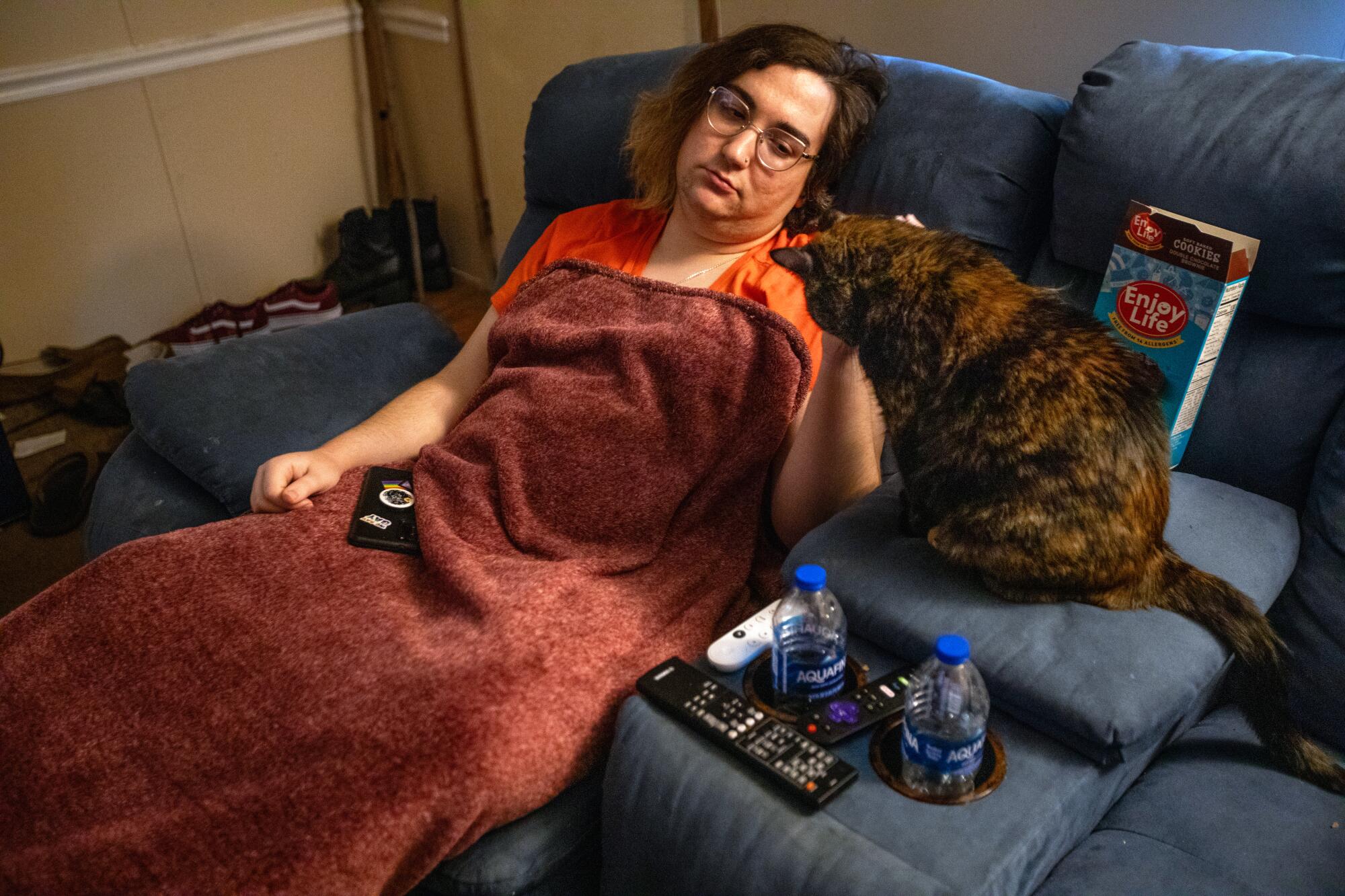
At that point, it wasn’t the laws but everyday life that was the biggest challenge. As she came out to more people, some relationships soured. Others flourished.
The occasional stranger called her “sir.” One friend suggested she fell for a trend in gender fluidity. Rin stopped speaking to her grandmother after she refused to acknowledge Rin’s new identity. But her mother accepted her. Rin’s colleagues at her small IT company, about half of whom lived locally and had met her in person, treated her no differently.
In August 2022, the state medical board banned the use of Medicaid for hormone blockers, hormone treatment or surgery for transgender people of all ages.
Rin was thankful to have private insurance through her job.
She was beginning to feel more at ease with herself. She was finally comfortable looking in a mirror and hearing her voice. Yet she saw the Sunshine State becoming a darker place.
In October 2022, the state medical board banned doctors’ offices from prescribing puberty blockers and hormones to people under 18, with exceptions for minors already under treatment.

“The laws were all hateful,” she said. But Rin said it was like “just driving by this car wreck” and realizing, “at least I’m not in this car wreck.”
But it got her thinking. Might the politicians start targeting adults? Rin rushed to switch her sex designation and name on official documents. By December, a judge and the Bureau of Vital Statistics signed off on it all.
Rin held on to what helped her survive: Her clinic. Friends across the country made through gaming. Her mom, who moved to Miami for a new job but would visit and listen to her daughter’s woes.
Then came the bill that got her attention. A Republican state senator from Jacksonville filed legislation on March 3 to ban transgender youths from using puberty blockers and hormones. It also said only doctors could prescribe hormones for transgender adults.
The majority of transgender patients receiving hormones, experts believe, were getting them from nurse practitioners — who are allowed by the state to write prescriptions and run primary care practices without an attending doctor.
Rin had long considered leaving her small town for a more liberal city in Florida or on the West Coast but had repeatedly shoved the idea aside. Now, she treated it more seriously.
A federal judge temporarily blocked portions of a new Florida law that bans transgender minors from receiving puberty blockers.
In April, during discussions on a new bill, a Republican state legislator publicly described transgender Floridians as “mutants” and “demons.” The same month, the Florida education department expanded the state’s ban on instruction on sexual and gender identity through the 12th grade.
Rin saw the discourse and laws about transgender people getting uglier — and closer to her.
She started saving hormone doses. A single 5-milliliter vial of estrogen officially has a shelf life of 28 days after opening, but there’s often liquid left. Rin scoured Reddit and online write-ups by experts to learn that many people use vials longer, as long as they’re properly stored.
In mid-May, DeSantis signed multiple bills into law, including one making it a crime for transgender people to use bathrooms at public parks, beaches, schools, airports and other government buildings that do not match the gender assigned to them at birth. Another prohibits teachers from asking students about their preferred pronouns and sharing their own. A third lets medical professionals cite religious beliefs to deny people care.
“I turned the flashlight on myself. The walls I had built up weren’t there. It was sticks glued to rocks and it tumbled.”
— Violet Rin
And it was now law that only doctors could prescribe hormones for transgender adults — the law doesn’t affect cisgender people — and require transgender patients to sign a new state-approved consent form. (The state took 44 days to release the form.)
Rin’s clinic, which had one overbooked doctor and four nurse practitioners, stopped working with transgender patients and refused to see her again.
In chatrooms, Rin saw transgender Floridians complain of running out of medication and being forced to “de-transition.”
Her decision was made.
“I used to love it here,” Rin said of her home state. “But how do I live here if this place doesn’t allow me to be me?”
Florida wants to “eradicate us,” she wrote on GoFundMe, pleading for donations toward “escaping this hateful place.”
At first she considered the recently proclaimed trans sanctuary of New Mexico, then landed on Oregon, another of the blue states that passed laws to protect transgender rights. She knew a few people in Portland, and on an earlier visit there fell in love with how easily she could blend in. An older cousin, Lauren, who had come out as transgender in the spring, offered to move with her.
Rin posted her GoFundMe link on Twitter. She made a YouTube video, standing in front of a blue, pink and white transgender Pride flag to ask for help.
“One dollar, $5, anything that you can spare,” Rin said.
Through the chat network Discord and a transgender news Substack, she met people offering safe houses along the way for people leaving red states. She confirmed that her insurance was accepted in Portland. She sorted through belongings to decide what to sell on Craigslist.
She trained her cats, Wrecker and Zoey, to walk on leashes in order to get air during the cross-country drive in her Subaru with a Florida-shaped rainbow bumper sticker.
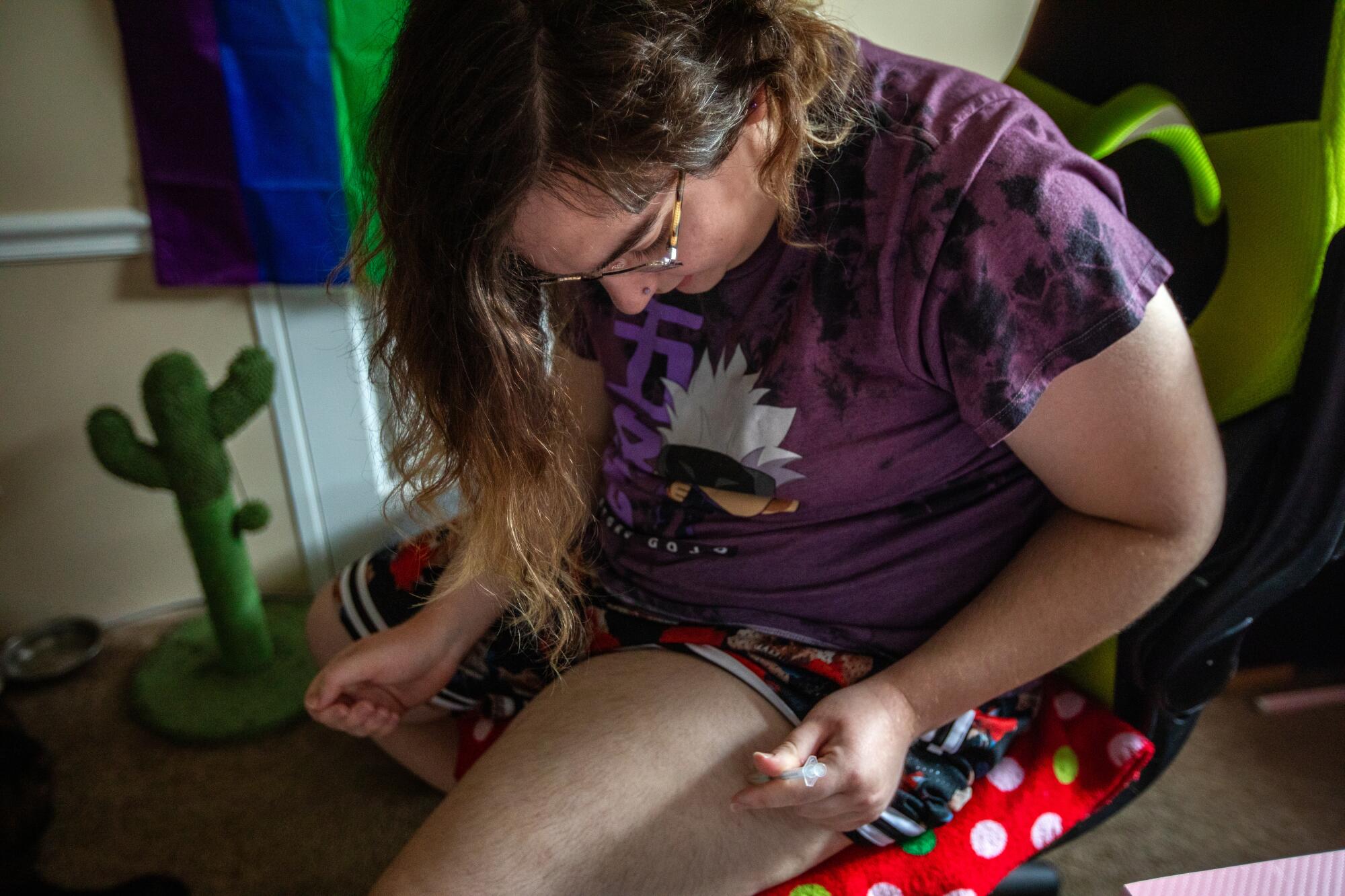
Rin’s most immediate problem was a dwindling supply of meds. She had two vials of estrogen — enough for about two months — and two refills. But a manufacturing shortage and a run on the medication had made it hard to find.
In early June, a federal judge put a temporary hold on a part of one law that bans puberty blockers and hormones for people younger than 18 who are transgender.
Rin saw it as progress. But it didn’t help her.
In mid-June, she learned that a transgender health company called Plume was holding pop-up clinics, where doctors who lived elsewhere but held licenses in Florida would prescribe hormones.
Rin drove 2½ hours to Orlando for an appointment.
“I’ll buy myself a little time to save more to move,” she said.
Even though Florida Gov. Ron DeSantis has signed anti-LGBTQ+ laws, tens of thousands of LGBTQ+ people are heading to the state for the annual Gay Days.
But her excitement turned to nervousness before she reached Orlando. About 30 minutes out, she realized she had to go to the bathroom. She didn’t know which restrooms were safe for a woman who was often misread as a man. She had never faced confrontation while using a bathroom but had grown fearful after seeing viral videos of transgender men and women who did.
She pulled off the highway and spotted a Subway. “Small restaurants and gas stations tend to always have single-stall bathrooms,” she said. It wasn’t gender-neutral, but it would do.
In Orlando, a group of doctors and volunteers — flown in from Texas, Maine, Pennsylvania and New Jersey — welcomed her at a single-story, concrete building. A police SUV was parked outside in case of protest, and the temporary clinic emailed Rin its address only the day before. The medical workers gave her lollipops, a blood pressure test and a consent form explaining that hormones would change her body in ways reversible and irreversible.
“Everything I want,” Rin said with a laugh as she signed.
The clinic created its own form because the state hadn’t released the required official version.
“I used to love it here. But how do I live here if this place doesn’t allow me to be me?”
— Violet Rin
For an hour, the group in Orlando went over Rin’s medical history and coming-out journey.
“We just want to make sure that we do what we need to do to allow you to continue getting your prescriptions,” said the doctor, a cisgender woman.
“I wish it was better here,” Rin told the physician. “Really, if I could stay, I’d rather stay.”
Rin now had more time to plan and save for her move. She walked out of the building with her shoulders lifted.
“Relief,” she said.
She drove out past the neighborhood’s rainbow flags, Cuban and Puerto Rican cafes and towering palm trees onto the highway toward home.
Back in Middleburg, Rin turned to the news every day. She hoped a new lawsuit or court decision would change her mind on moving. Maybe she could stay. She waffled on her decision through sleepless nights.
On June 22, a federal judge struck down the state rule preventing Floridians from using Medicaid to transition. Rin cheered the move. Still, it did nothing in her world.

Then, on June 30, the state released the new consent form for transgender patients. It warned against “purely speculative” treatments and required psychological evaluation before receiving hormones and every two years after. That deviated from World Professional Assn. for Transgender Health recommendations that say “gender-affirming interventions are based on decades of clinical experience and research and are not considered experimental.”
“They’re doing everything they can to make it harder for us,” Rin said. “I figured out my prescription and was thinking maybe I could make things here work. Not anymore.”
In an attempt to reconnect before the move, she visited her 87-year-old grandmother, even though they hadn’t spoken for a year. She surprised Rin by calling her “Violet” and gave her a $200 check for the move and an old Polaroid camera that had belonged to her grandfather.
Rin started to go on meandering drives to take in her last views of town. She photographed her favorite sights: the St. Johns River with the Jacksonville skyline, a spring-fed pool in Green Cove Springs, palmettos flanking a small-town road. She posted them to an Instagram account dedicated to “my Florida.”
Behind the wheel, she played chillwave, letting her mind drift with the music and away from her worries, so she could appreciate her state for what it was: beautiful, diverse, flawed.
And, she hoped, not home for too long.
More to Read
Sign up for This Evening's Big Stories
Catch up on the day with the 7 biggest L.A. Times stories in your inbox every weekday evening.
You may occasionally receive promotional content from the Los Angeles Times.

